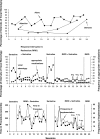The effects of response interruption and redirection and sertraline on vocal stereotypy
- PMID: 20514198
- PMCID: PMC2790934
- DOI: 10.1901/jaba.2009.42-883
The effects of response interruption and redirection and sertraline on vocal stereotypy
Abstract
Although response interruption and redirection (RIRD) has been shown to be successful in reducing vocal stereotypy, recent reports have suggested that selective serotonin reuptake inhibitors (SSRIs) may also reduce these behaviors. The purpose of the current investigation was to examine the effects of RIRD with and without sertraline on automatically maintained vocal stereotypy of a 4-year-old boy with autism. Results suggested that vocal stereotypy decreased when RIRD was implemented and that sertraline did not affect the participant's vocal stereotypy.
Keywords: autism; response interruption; selective serotonin reuptake inhibitors; sertraline; vocal stereotypy.
Figures

Similar articles
-
The effects of matched stimulation and response interruption and redirection on vocal stereotypy.J Appl Behav Anal. 2012 Fall;45(3):549-64. doi: 10.1901/jaba.2012.45-549. J Appl Behav Anal. 2012. PMID: 23060668 Free PMC article.
-
Further evaluation of response interruption and redirection as treatment for stereotypy.J Appl Behav Anal. 2011 Spring;44(1):95-108. doi: 10.1901/jaba.2011.44-95. J Appl Behav Anal. 2011. PMID: 21541130 Free PMC article.
-
Parametric analysis of response interruption and redirection as treatment for stereotypy.J Appl Behav Anal. 2015 Spring;48(1):96-106. doi: 10.1002/jaba.186. Epub 2015 Jan 30. J Appl Behav Anal. 2015. PMID: 25640901
-
Response interruption and redirection: current research trends and clinical application.J Appl Behav Anal. 2013 Summer;46(2):549-54. doi: 10.1002/jaba.38. Epub 2013 May 17. J Appl Behav Anal. 2013. PMID: 24114172 Review.
-
Treating functional impairment of autism with selective serotonin-reuptake inhibitors.Ann Pharmacother. 2004 Sep;38(9):1515-9. doi: 10.1345/aph.1D543. Epub 2004 Aug 3. Ann Pharmacother. 2004. PMID: 15292500 Review.
Cited by
-
Evaluation of the immediate and subsequent effects of response interruption and redirection on vocal stereotypy.J Appl Behav Anal. 2011 Fall;44(3):681-5. doi: 10.1901/jaba.2011.44-681. J Appl Behav Anal. 2011. PMID: 21941405 Free PMC article.
-
The effects of tact training on stereotypic vocalizations in children with autism.Anal Verbal Behav. 2012;28(1):101-10. doi: 10.1007/BF03393110. Anal Verbal Behav. 2012. PMID: 22754107 Free PMC article.
-
The effects of matched stimulation and response interruption and redirection on vocal stereotypy.J Appl Behav Anal. 2012 Fall;45(3):549-64. doi: 10.1901/jaba.2012.45-549. J Appl Behav Anal. 2012. PMID: 23060668 Free PMC article.
References
-
- Hellings J.A, Kelley L.A, Gabrielli W.F, Kilgore E, Shah P. Sertraline response in adults with mental retardation and autistic disorder. Journal of Clinical Psychiatry. 1996;57:333–336. - PubMed
-
- Martin A, Scahill L, Charney D.S, Leckman J.F. Pediatric psychopharmacology: Principles and practice. New York: Oxford University Press; 2003.
-
- McDougle C.J, Brodkin E.S, Naylor S.T, Carlson D.C, Cohen D.J, Price L.H. Sertraline in adults with pervasive developmental disorders: A prospective open-label investigation. Journal of Clinical Psychopharmacology. 1998;18:62–66. - PubMed
MeSH terms
Substances
LinkOut - more resources
Full Text Sources

